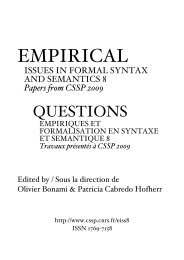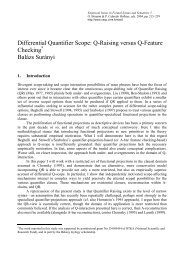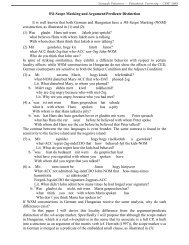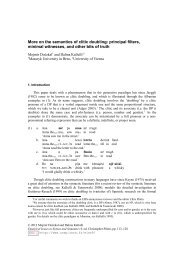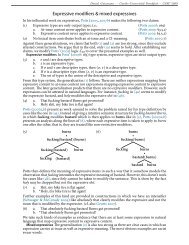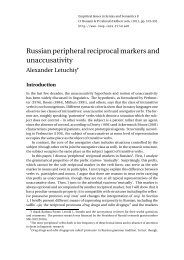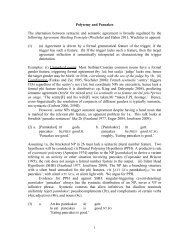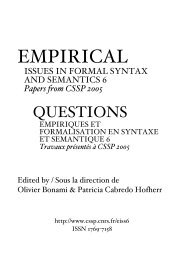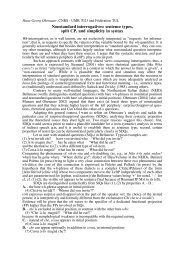Empirical Issues in Syntax and Semantics 9 (EISS 9 ... - CSSP - CNRS
Empirical Issues in Syntax and Semantics 9 (EISS 9 ... - CSSP - CNRS
Empirical Issues in Syntax and Semantics 9 (EISS 9 ... - CSSP - CNRS
Create successful ePaper yourself
Turn your PDF publications into a flip-book with our unique Google optimized e-Paper software.
The (non)universality of syntactic selection <strong>and</strong> functional<br />
application<br />
Jean-Pierre Koenig <strong>and</strong> Kar<strong>in</strong> Michelson ∗<br />
University at Buffalo, The State University of New York<br />
Noth<strong>in</strong>g beats diversity for f<strong>in</strong>d<strong>in</strong>g out what is truly universal about natural languages. But<br />
the importance of diversity goes beyond the obvious fact that universality can be recognized<br />
only <strong>in</strong> the face of diversity. Com<strong>in</strong>g to grips with languages that differ <strong>in</strong> important ways from<br />
more familiar languages forces us to recognize implicit analytical assumptions. Rather than<br />
assum<strong>in</strong>g a requisite ‘traditional’ way of analyz<strong>in</strong>g certa<strong>in</strong> data, we must <strong>in</strong>stead acknowledge<br />
the assumptions our analysis depends upon, assumptions that dem<strong>and</strong> justification. Confront<strong>in</strong>g<br />
an ‘exotic’ language (where exotic means dist<strong>in</strong>ct from what we know) forces us to ask what<br />
the empirical basis is for an analysis; it can also drive us to conceive of a new <strong>and</strong> different<br />
organization of the grammatical systems of the languages we already know much about. In<br />
short, it can wake us up from a dogmatic slumber. For some, the idea that languages are quite<br />
diverse <strong>in</strong> their grammatical systems is a given (e.g. Evans <strong>and</strong> Lev<strong>in</strong>son 2009), so draw<strong>in</strong>g<br />
attention to the value of diversity is not new. We pose a further question <strong>in</strong> this paper: What<br />
takes the place of features that are often thought to be universal but that we show are only very<br />
frequent? To put it another way, we engage <strong>in</strong> a k<strong>in</strong>d of reconstruction of our analytical tools<br />
us<strong>in</strong>g the rather ‘exotic’ language Oneida, a Northern Iroquoian language.<br />
We will make two bold claims about Oneida that make the description of Oneida look<br />
different from most (if not all) descriptions of other languages <strong>and</strong> that provide the <strong>in</strong>centive for<br />
our reassessment of how to th<strong>in</strong>k about possible grammatical systems. 1<br />
Claim 1. There is no syntactic selection of phrases by verbs (or nouns) <strong>in</strong> Oneida.<br />
∗ We gratefully acknowledge the Oneida speakers from the Oneida Nation of the Thames <strong>in</strong> Ontario, Canada,<br />
who, s<strong>in</strong>ce 1979, have so will<strong>in</strong>gly <strong>and</strong> enthusiastically shared their knowledge of the Oneida language <strong>and</strong> culture<br />
with Kar<strong>in</strong> Michelson. Especially valuable as evidence for the claims of this paper are excerpts from recorded “stories’<br />
(life histories, ghost stories, hilarious events, conversations about family, etc.); these are identified by speaker, a<br />
title, <strong>and</strong> the year recorded. Unattributed examples are from Norma Jamieson or from Michelson <strong>and</strong> Doxtator 2002.<br />
We thank Rui Chaves, Jeff Good <strong>and</strong> Hanni Woodbury for comments on a previous version of this paper. We also<br />
thank the reviewers, <strong>and</strong> especially Christopher Piñón, for their comments.<br />
1 Throughout this paper, we will abstract away from important differences among syntacticians <strong>and</strong> semanticists<br />
on how to best account for the generalizations which Oneida challenges, or the importance of these generalizations.<br />
But, we believe that someth<strong>in</strong>g roughly equivalent to syntactic selection <strong>and</strong> functional application is part <strong>and</strong> parcel<br />
of the model of (most) natural languages <strong>in</strong> all extant frameworks. For <strong>in</strong>stance, although the constructionist approach<br />
presented <strong>in</strong> Goldberg 1995 does not discuss the relation between verbs <strong>and</strong> subjects or objects <strong>in</strong> terms of syntactic<br />
selection, her notion of profil<strong>in</strong>g of participant roles embodies the bulk of what we mean by syntactic selection.<br />
Similarly, although Langacker (1987) po<strong>in</strong>ts out the limits of compositionality <strong>and</strong> does not adopt lambda-calculus<br />
<strong>and</strong> the concept of functional application to model the compositional aspects of semantic comb<strong>in</strong>atorics, his notions<br />
of elaboration <strong>and</strong> elaboration sites embody the critical aspects of both for our purposes.<br />
© 2012 Jean-Pierre Koenig <strong>and</strong> Kar<strong>in</strong> Michelson<br />
<strong>Empirical</strong> <strong>Issues</strong> <strong>in</strong> <strong>Syntax</strong> <strong>and</strong> <strong>Semantics</strong> 9, ed. Christopher Piñón, pp. 185–205<br />
<strong>EISS</strong> 9 http://www.cssp.cnrs.fr/eiss9/



